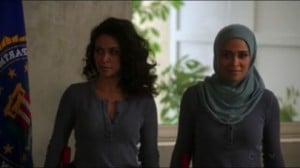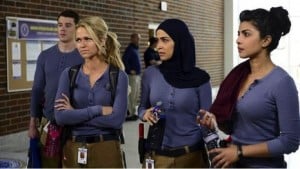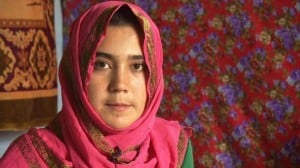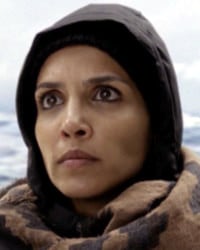Nadia Jebril was once known as “that Muslim girl with the Skåne accent.” With her new show Rena Rama Arabiskan (“Pure Arabic”) Jebril has both moved beyond that simplistic label and inadvertently added to the clamor and the clangor of the bells of doom tolled by Eurabia cassandras in Sweden.
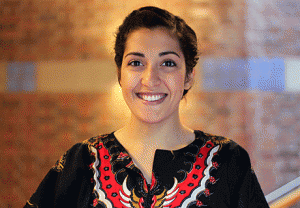
Like comedian (and now TV and radio show host) Gina Dirawi, Jebril began her career as an internet celebrity. At the age of 15, she created a site about Islam in Swedish, which was discovered by the editorial team of the TV program Mosaic, who then invited her to participate in a studio debate on (what else?) the veil. Jebril, whose Palestinian parents moved to Sweden in the 60s, had decided to veil for herself; her sisters did not wear hijab. That, and her pronounced Skåne accent, brought her into the media spotlight as a figure who could take the Islam/West discussion beyond the usual binaries.
In 2000, she began to write for the online magazine Sourze; a year later she wrote columns for Sydsvenskan, and the year after she was offered the job of being a presenter – until she learned that presenters on TV were not allowed to wear anything which was deemed to indicate bias, which included the veil. In this 2003 article she was asked “How do you see the criticism that the veil makes you seem biased?” to which she responded:
the important thing is that I do my journalistic work as objectively as I can…[it was] a bit disappointing that it was so hard to see me as an individual beyond the veil, it was as if my identity would be hung on a piece of fabric.
Instead of being a presenter, Jebril worked as a reporter for six months, wearing a cap to cover her hair, which she describes as “a stepping stone to get the veil accepted on TV.”
Jebril, who has since “de-hijabed,” now has a new series on SVT2. Rena Rama Arabiskan began in November, but Jebril has been blogging about her journey around Europe since February, including talking about meeting Joumana Haddad, discussing culture and music and posting trivia, from the use of numbers in Arabic internet chat to why Gaddafi’s name can be transliterated so many ways.
The series is a journey through Arabic as a language, as well as an actual journey through nine countries to answer questions about how Arabic entered Europe, who speaks it today, and what the future of the language will be. At one point, Jebril comments “There is an Arabic-speaking parallel world in Europe. You no longer have to go all the way to the Middle East to experience Arabic.” The first episode is set in Sweden, beginning with Jebril describing her own sense of having “a Palestinian aunt and a young Skåne woman” in her head, dreaming in Arabic and speaking in Swedish. Jebril carries a sign with “Do You Speak Arabic?” written on it in Arabic through the streets of Stockholm, and soon meets Fredrick, a Swede who learnt both Arabic and Turkish from friends, as well as half-Egyptian half-Swede goal-keeper Rami Shaaban, whose grandmother is the actress Sherifa Maher.
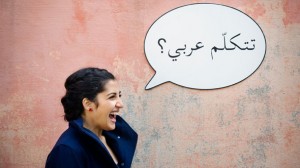
True to the title of the episode “Arabic: Language of the Future,” Jebril asks whether Arabic will one day grow to be a major language in the old continent, given the growing Arab population. All of this, of course, is manna for those who fear and warn of the Eurabia scenario. For example, one blogger comments:
this young woman is very perceptive and I think she’s right. It’s sad but we in Malmö are there and the whole of Sweden will get there…when we hear Arabic babble around us we look back to bygone times and feel a pang in the heart, how did this happen? What are we leaving to our children, can we ever repair this?
On a popular message board, Rena Rama Arabiskan was used to fan fears of what was described as “demographic colonialism,” rehearsing the arguments expounded in Muslim Demographics, debunked by BBC Radio 4. Again, the show’s premise is distorted to appear to advocate or celebrate Eurabia. When a lone person asks why Arabic is more frightening than French or Spanish, he gets the reply that Arabic sounds like throat-clearing and that it is not indigenous (apart from Spain and Sicily, where it was spoken for 500 years) and will lead to the Balkanization of society.
One might have thought these fears would have been reassured by the end of the first episode, when a linguist informs Jebril that trends show second- and third-generation children learn to value the language that will be most useful to them in society, and that the language of the homeland grows irrevocably weaker with each generation. The series itself proves the linguist right, as Jebril is frank about her struggles with reading and writing, and most of the second-generation people she meets express concern that their children barely speak Arabic. In fact, one of her guests makes the comparison between the time when Arabic loanwords in European languages were plentiful and often scientific (alchemy), and now, when they enter only through slang (jalla in Swedish).
But Jebril’s program is about much more than linguistic trends; through talking about language the series can bring in culture, religion, and politics. When Jebril meets Swedish soldiers being taught Arabic, for example, she wonders whether it is truly possible to learn both Modern Standard Arabic and the Egyptian dialect, and “understand” Arab culture, all in less than a year, and speaks to their tutor about what it means to teach Arabic in this militarized context.
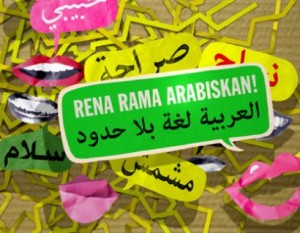
In the second episode, Jebril visits Denmark to talk to comedian Omar Marzouk and novelist Duna Ghali about bilingualism and bridging cultures. Next she visits London, where many of the more signficant Arab dailies are published, takes a tour of the offices of Al Jazeera and the newspaper Al Quds al Arabi and talks about media, the divide between fusha/classical and local dialects of Arabic, and whether or not “Fusha Land” is elitist. It’s a little dissappointing that Jebril does not speak with any of the many Arab women journalists in London. Although she speaks to women, including a Libyan blogger and a media studies student, that the only journalists interviewed are male has the effect of representing men as the guardians of the classical language, an impression pushed home when a young woman explains she speaks Arabic but if her father puts the newspaper in front of her it takes her an hour to read a sentence. But what about the role of mothers who are often the ones teaching the children to read and write fusha?
In the third episode “Kiffe Kiffe, Generation Beur” Jebril goes to France where “the Arabic language and Arab culture are an important source of inspiration” for the artists she meets, and there is no gender division here. Jebril meets both men and women artists, from Cheb Khaled, to Lebanese singer Yasmine Hamdan working “to bring the Arabic language into mainstream pop culture” to author Faiza Guene and calligrapher Julien Breton. Finally in the most recent episode, Nadia Jebril visits Spain and discusses Andalusian history and the poetry of Ibn Arabi, in an episode which highlights the edutainment element of the series. This educational factor is behind the series’ being promoted by the Institute for Language and Folklore and by university humanities faculties such as Gothenburg, where students of Arabic met with and interviewed Jebril on the series.
While Jebril insists the series has no political agenda, she expresses her hope that Rena Rama Arabiskan will help people become more accepting of the Arabic language, moving to a more sympathetic view she believes the protest movements of the “Arab Spring” have contributed to: “Today we no longer see Arabs solely as victims or oppressors, but as people like everyone else, who just want to live well and who are prepared to fight to achieve this goal. And this has prompted a resurgence of interest.”
Whether or not that is the case, and despite the manipulation of the series by some to fuel fears of the onslaught of Eurabia, Nadia Jebril has clearly gone beyond being labeled “that Muslim girl with the Skåne accent,” proving that she has much more to offer beyond being reduced to a spokesperson for her faith.




